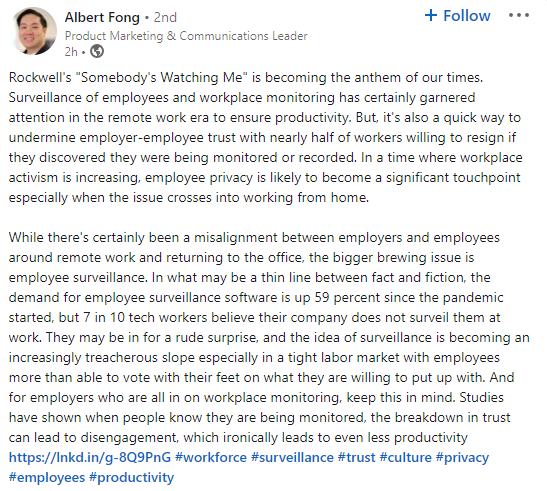03 Jun Well yes, but actually you are.

Photo by Tobias Tullius on Unsplash
“We’d rather quit than be monitored.” So says a recent article published on LinkedIn. (https://www.linkedin.com/news/story/wed-rather-quit-than-be-monitored-5880970/) I mean, yes, of course, but at the same time: be real with yourself, especially if you have any type of employer tech in your home. I’m not trying to cultivate a spirit of fear or paranoia – I’m just trying to encourage you to be realistic.
Anyhow, in the same way that salary transparency is becoming law in more places, I think it’s good that states are requiring companies to inform employees if they are being surveilled. In the meantime, for situations where companies are not required to tell you this information, please just automatically assume that your keystrokes are being logged and screenshots are being taken if you are using any form of technology from an employer. Better to be safe than sorry.
If you freelance or otherwise work for yourself, USE YOUR OWN TECH. If you use someone else’s technology, their accounts, their passwords, etc., it can open you up to liabilities if anything goes wrong. It also opens up a can of worms for them to be able to sit and watch everything you do, time your bathroom breaks, and so on. One of the things companies can do with this data is pay you for a project, screenshot everything you do, and then give that data to a cheaper freelancer to use as breadcrumbs. In other words, “Hey, here’s what this $100/hr person did. Now let’s get a $10/hr person to try to duplicate the same tactics for us.” If you escaped Corporate America to leave that mess behind, don’t turn around and bring it in to your own business.
–https://causeyconsultingllc.com/2022/05/14/the-digital-panopticon/
Exactly that: better to be safe than sorry.
In the blurb for the LinkedIn article, editor Cate Chapman writes:
“As remote work gives rise to an increase in the monitoring of employees, most tech workers say they’d rather quit than accept certain forms of surveillance through their computers. A Morning Consult survey showed more than half would leave an employer who recorded audio or video of them — or who used facial recognition to monitor productivity. The poll also showed slightly fewer than half would resign over having keystrokes tracked, or if screenshots were taken of their computer screens. Seven out of 10 tech workers said they don’t think their employer monitors them at work.”
That last line is so troubling to me. Is it denial? Or just naïveté? I’m not sure, but:

The Morning Consult/Axios article that LinkedIn refers to can be found here: https://www.axios.com/2022/05/31/tech-workers-quit-employer-recorded-surveillance?utm_source=linkedin&utm_medium=social&utm_campaign=editorial&utm_content=technology-techworkers. I will quote from that article now:
“By the numbers: The survey also found that more than half of tech workers would not take a new job in their field if the company used a surveillance technique.
Roughly 7 in 10 tech workers said they believe their company does not surveil them at work.
Be smart: Employers have the right to do quite a bit of monitoring in the workplace, especially of what is happening with company gear.
But in a tight labor market, employees can also vote with their feet on what they are willing to put up with. And the equation changes a lot when, as is often now the case, an employee’s office is their home.”
As I said in my article about the Digital Panopticon, if you freelance or operate your own business, use your own tech. Periodt. There’s a whole host of yucky things a micromanager boss or client can “justify” if you are using their equipment in your home. One LI responder wrote:

Yeah… it’s almost like it’s not about engagement, it’s about surveillance and control. Someone oughta write a blog post about that… https://causeyconsultingllc.com/2022/04/18/engagement-or-surveillance/
Here’s the thing: yes, when there are plenty of jobs to go around, it’s easier to vote with your feet and move on. But what happens in the event of a recession and a higher unemployment rate? Buried inside an article about the housing market, we find an important nugget:
So now, I want you to re-read the paragraph from the Yahoo Finance article one more time:
“Third, the U.S. economy is losing steam. The Fed isn’t just attacking exuberance in the housing market: they’re also attempting to slow down the red-hot labor market. Fed Chair Jerome Powell has acknowledged that pulling inflation back down will likely require an uptick in unemployment. If the Great Resignation has its own Great Deceleration, it’ll undoubtedly trickle over into the housing market. There’s something else. If a recession does come, employers could use their increased economic leverage to force staffers back into the office. If that happens, it could dry up the WFH buying boom.” (emphasis mine)
I’ll say it one more time for the people in the back row: THEY ARE TELLING YOU IN ADVANCE WHAT IS GOING TO HAPPEN. Ignore it at your own risk.
–https://causeyconsultingllc.com/2022/05/31/shady-people-who-want-your-money/
A couple of general (albeit pessimistic) thoughts here:
One possibility is an increase in the “it’s time to come on back to the office” attitude. Employers just outright saying, “If you want to continue working here, you WILL show up Monday through Friday or you’re fired.” (This has already happened with Elon Musk, BTW.)
Another possibility is that some employers will continue to “allow” you to WFH, but you will have to submit to technological surveillance. The Digital Panopticon will move from the Cube Farm to your home office and that’ll be that.
What you should not do, in my opinion, is get overly comfortable as these 7 out of 10 individuals have, and assume you aren’t being watched simply because no one has confirmed that you are. Not all areas have laws requiring your employer to tell you if you are being tracked in some way, so… better to be safe than sorry.



Pingback:Causey Consulting, LLC | О Боже!
Posted at 15:25h, 07 June[…] –https://causeyconsultingllc.com/2022/06/03/well-yes-but-actually-you-are/ […]
Pingback:Causey Consulting, LLC | Well that didn’t take long.
Posted at 15:04h, 16 June[…] https://causeyconsultingllc.com/2022/06/03/well-yes-but-actually-you-are/ Need more? Email me: https://causeyconsultingllc.com/contact-causey/ […]
Pingback:Causey Consulting, LLC | Quiet Quitting, Part 2
Posted at 15:04h, 23 June[…] https://www.youtube.com/c/JosieNaikoi Need more? Email me: https://causeyconsultingllc.com/contact-causey/ […]
Pingback:Causey Consulting, LLC | “An increasingly rare perk”
Posted at 12:32h, 04 April[…] –https://causeyconsultingllc.com/2022/06/03/well-yes-but-actually-you-are/ published June 3, 2022 […]